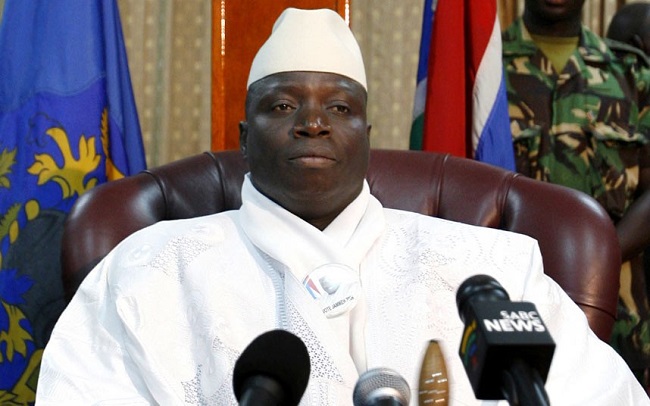
President Jammeh’s surprise defeat - What comes next?
Gambia’s strong man, President Yahya Jammeh, suffered an unexpected defeat in a presidential election held on December 1, 2016. He conceded defeat, congratulated the winner and a week later, he rejected the results.
The Gambia is a small West African country of about two million people. It sits right inside the Republic of Senegal like the middle finger in a lump of butter. It has a small coastline.
That country won independence from the United Kingdom on February 18, 1965. On July 23, 1994, the regime of President Dawda Jawara was overthrown in a coup by Yahya Jammeh, then a junior military officer.
On September 27, 1996, Mr Jammeh won a presidential election and became civilian president of The Gambia. He won subsequent presidential elections until 2016 when he was defeated by a coalition of seven political parties led by Mr Adama Barrow, a property developer.
In the December 1, 2016 presidential election, Mr Barrow received 263,515 votes, representing 45.5 per cent. President Jammeh had 212,099 votes which is 36.7 per cent of the votes.
The third candidate, Mr Mama Kande, had 102,969 votes which is equal to 17.8 per cent.
However, the Electoral Commission headed by Mr Momar Njie, later revised the presidential election results. He reduced Mr Barrow’s votes to 43.29 per cent and increased the President’s votes to 39.64 per cent.
Voter turnout was 59 per cent of registered voters.
“I am very, very happy. I am excited that we won this election and from now, hope starts,” Mr Barrow said after the results were announced.
Some of his campaign promises are to revive the Gambian economy, create employment and reduce poverty at home. He added that poor economic growth with unemployment had forced employable young Gambians to traverse the dangerous paths to Europe.
President Jammeh had said in the past that if Allah (God) permitted, he would rule The Gambia for billions of years. He had expected to win the 2016 election with a landslide.
After the results were announced, jubilant Gambians took to the streets shouting: “We are free. We won’t be slaves of anyone.”
Foreign observers were not allowed into The Gambia to monitor the election and the social media was shut down.
Why was President Jammeh defeated in the 2016 presidential election? Why did he concede defeat? Why did he reject the results a week after?
President Jammeh had ruled The Gambia with a strong hand since 1994. He had oppressed the opposition parties and imprisoned some of his opponents and mass media practitioners.
He has been credited with the provision of massive infrastructural development – many hospitals, roads, schools, water and electricity.
However, economic growth was sluggish. Gross Domestic Product (GDP) was 0.9 per cent in 2014 (because of the Ebola outbreak and late rains). In 2015, the GDP rose to 4.7 per cent. It is expected to go up to 5 per cent in 2016.
Despite 22 years of massive infrastructural development, poverty, high cost of living and unemployment persisted.
Why did President Jammeh reject the polls and called for fresh election?
“After a thorough investigation, I have decided to reject the outcome of recent elections. I lament serious and unacceptable anomalies which have reportedly transpired during the electoral process,” the Gambian President said.
He added: “I recommend fresh and transparent election which will be officiated by a God- fearing Electoral Commission.”
President Jammeh later changed his mind. Instead of a fresh election, he told Gambians that he would take his case to the court for adjudication.
It appears that Mr Jammeh decided to reject the presidential election results because the chairman of the new ruling coalition had threatened to prosecute him later for crimes allegedly committed by the president in 22 years as leader of The Gambia.
The African Union (AU) had declared Mr Jammeh’s rejection of the results as “null and void” because he had already considered defeat.
“The chairperson of the Commission strongly urged President Yahya Jammeh to facilitate the peaceful transfer of power,” a statement from the office of the AU Commission stated.
Efforts to find a political solution to the development had, at the time of writing, proved futile – since the Gambian authorities refused to allow into their country the current Chairperson of the Economic Commission of West African States (ECOWAS), Mrs Ellen Sirleaf-Johnson.
Ghana, a former British colony in West Africa that won independence from the United Kingdom in 1957, also went to the polls on December 7, 2016.
Like in Nigeria, a “comeback kid” in the person of Nana Addo Danquah Akuffo Addo of the New Patriotic Party (NPP) won the presidential election with a landslide. He contested the elections three times – 2008, 2012 and 2016.
The political trend in Nigeria appears to have replicated in Ghana.
General Mahamadu Buhari, the current Nigerian leader, contested presidential elections four times. He won the fourth time with a landslide.
His last opponent, President Goodluck Jonathan, the incumbent, had served part of the term of the late President Yar’dua and later won a four-year term of his own.
President John Dramani Mahama of Ghana, also Vice President then, had served part of the late President John Evans Atta Mills’ term before contesting and winning the 2012 presidential elections. He took part in the 2016 polls and lost.
(
